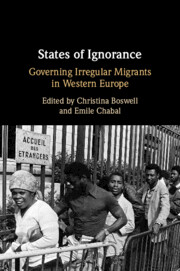‘Based on impressive research that spans decades and countries, the authors show how state actors actively perpetuate ignorance about irregular migrants, often to serve their strategic ends. States of Ignorance is one of those rare books that makes you see the world differently.’
Erik Bleich - Charles A. Dana Professor of Political Science, Middlebury College, Vermont
‘This rich and original collection of essays throws new light on the logics of state intervention in the complex and contentious field of unauthorised migration. Inverting the conventional figure of the state as an engine of evidence-based knowledge production about populations and mobilities, contributors unpick its less familiar role in the production of ignorance and information scarcity as deliberate strategies of governance and legitimation. This subtly deployed concept of ‘state ignorance’ unlocks fresh empirical and theoretical insights into the management of public expectations and the intended and unintended results of policy-making in this sensitive arena.’
Jane Caplan - Emeritus Fellow, St Antony’s College, University of Oxford
‘Boswell and Chabal have produced an outstanding volume on an essential but ill-understood topic: undocumented migration. They approach this highly complex and sensitive area with conceptual sophistication - focussing on ignorance (as an omission, a strategy, and an ascription) as a form of knowledge and knowledge production - and empirical rigor, with detailed empirical chapters on the United Kingdom, France, and Germany. This is a must-read for anyone who wishes to understand knowledge production, state capacity, and immigration in north-western Europe.’
Randall Hansen - Canada Research Chair in Global Migration, University of Toronto
‘When do states pretend they do not see, and from which objects do they avert their gaze? This book compellingly argues that ‘ignoring like a state’ may be even more fundamental to contemporary governance than ‘seeing like a state.’ Deeply researched case studies about irregular migration in western Europe significantly enrich our knowledge of that phenomenon, showing how different state bureaucracies develop unique cultures of wilful ignorance. This book is essential not only for scholars of irregular migration but for anyone who studies the modern state.’
Lauren Stokes - Associate Professor of History, Northwestern University, Illinois



